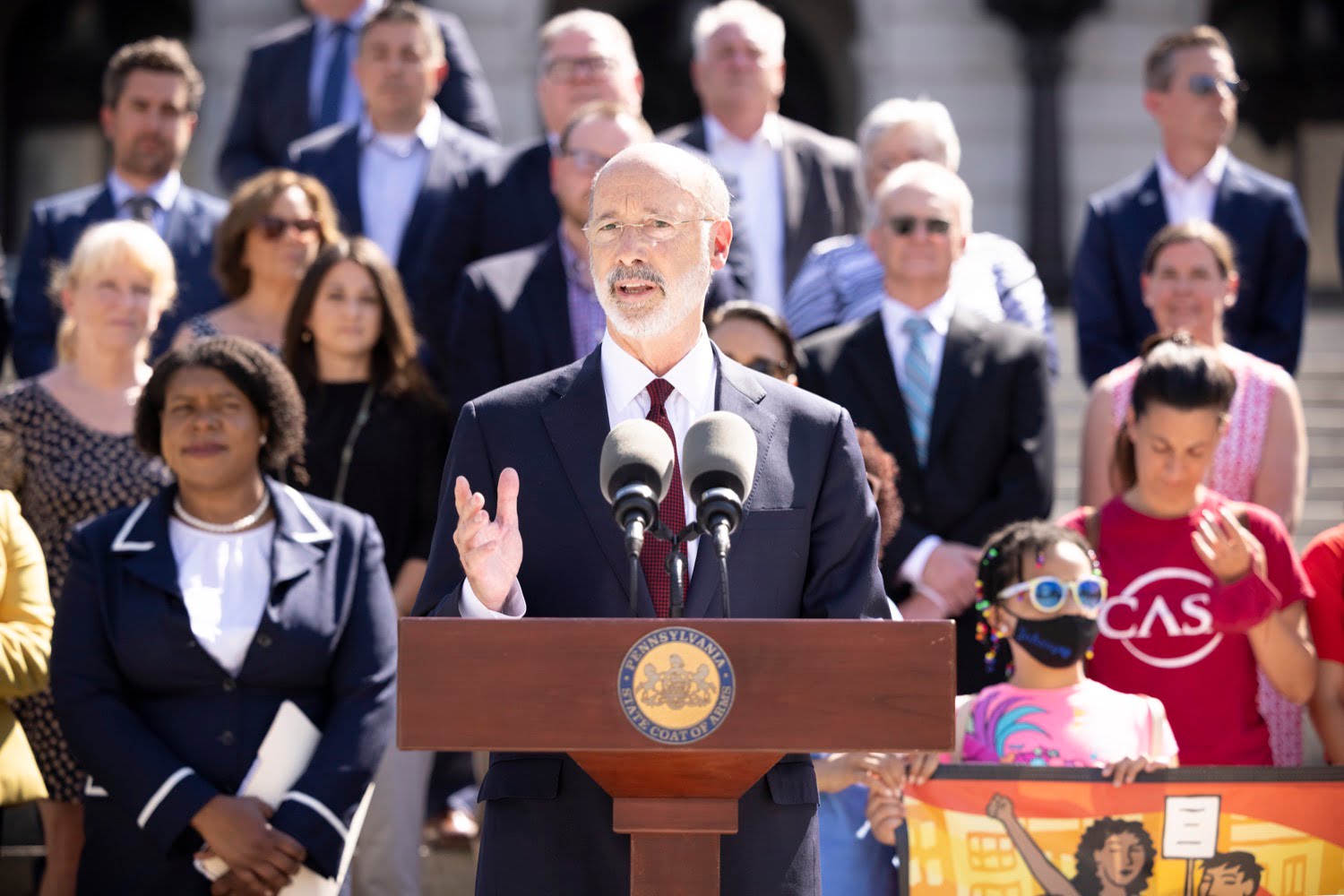Gov. Tom Wolf joined legislative leaders and education stakeholders at the state Capitol to celebrate the largest state funding increase for public school students in Pennsylvania history and the groundbreaking funding in the new Level Up initiative to provide an additional $100 million to the 100 lowest wealth school districts (Commonwealth Media Services photo).
Counties want to count mail ballots before election day, but House Republicans need new restrictions to back it — which Wolf opposes
by Stephen Caruso, Pennsylvania Capital-Star
September 27, 2021
Gov. Tom Wolf and the Republican-controlled House and Senate are once again poised to clash over Pennsylvania’s election administration this fall — and all three are not on the same page.
None of their debates are new. They want to act to give county election officials what they’ve been asking for since at least spring of 2020: time to process and count mail-in ballots before Election Day, and longer deadlines to turn around mail-in ballot applications.
Without these changes, the issues that plagued Pennsylvania’s 2020 election — such as the five days it took to fully count mail-in ballots before President Joe Biden was declared the winner in the Keystone State— will continue, elections officials say.
“If Pennsylvania is not comfortable being dead last in the nation, then we need to make that change,” Lycoming County Election Director Forrest Lehman told the Capital-Star.
But the politics of election reform has only gotten worse in the past year, after former President Donald Trump placed his hopes of keeping office on spreading widespread fear and doubt in election results.
Any proposal that’ll become law must manage to appeal to Trump’s most hardcore supporters in the General Assembly, allow Wolf to stay true t0 his promise to block “voter suppression,” and address those county priorities.
As of Monday Wolf said that nothing he’s seen “meets all my criteria” to sign into law.
Although Wolf did not go into policy specifics, he’s already vetoed one Republican election bill in June over his stated opposition to voter suppression. His veto message at the time cited measures pushed by Republicans. such as expanded ID requirements to vote.
But similar measures will likely be in any bill that could reach his desk — unless Republicans cut him out entirely by advancing constitutional amendments.
With the help of some Pennsylvania Republicans, “election integrity,” a catch-all term Republicans have used to refer to solving trumped up claims of election mismanagement, has begun to register with the conservative base.
Capitol siege lays bare GOP electoral misinformation in Harrisburg
In a reinforcing cycle, that means that Republican legislators now feel pressure to only vote for a sufficiently tough voting bill that includes such provisions as restrictions on returning mail-in ballots, signature verification for such ballots, stricter voter identification provisions, and regular election audits alongside counties needed reforms.
All of those provisions are in a new, 183-page bill by House State Government Committee Chairperson Seth Grove, R-York, which passed out of committee Monday in a party line, 15-10 vote.
Each provisions is necessary to get House Republicans to vote for any sort of election law changes, Grove said Monday.
“I think you heard the comments from the Republican members on this committee about what they want to see in election reform, and I’m not sure that hits the mark,” he told the Capital-Star.
Grove’s original bill, which is very similar to his new effort, drew some token opposition among his conservative colleagues back in June. At the time, three House Republicans voted against it, including state Rep. David Zimmerman, R-Lancaster.
At the time, Zimmerman said that Grove’s bill didn’t go far enough compared to the people he’s heard from.
Those who’ve contacted him, Zimmerman said, were asking for an audit of the 2020 election, the full repeal of no-excuse absentee ballots, and voter ID.
“Those are the three things people all across Pennsylvania are asking for,” Zimmerman added. “And so far, we’ve not addressed any of them.”
Even on the latter, Zimmerman said, he opposed a measure that let voters sign an affidavit saying they are who they say they are if they didn’t bring a ID to vote.
“There should be an ID or you don’t vote,” Zimmerman said.
However, as Grove tries to thread the needle of his caucus, county election officials have expressed concerns that it makes too many changes when only a few are needed. Wolf also indicated Monday he would veto it in its current form, despite his seeming change of heart on expanding voter ID requirements over the summer.
“Is there something out there — something that somebody calls ‘voter ID’ — that might be acceptable and not be voter suppression? Maybe,” Wolf said Monday. “I’m willing to have a conversation, but … I am against anything that suppresses the vote.”
Instead, county officials have asked for lawmakers to focus on a separate, bipartisan Senate proposal sponsored by Senate State Government Committee Chairperson Dave Argall, R-Schuylkill, which was the focus of a hearing last week.
Pa. county officials say bipartisan election reform bill is a step toward ‘badly-needed relief’
That bill is just 11 pages long. It gives counties three days to process and count mail-in ballots before Election Day, moves back the deadline to apply for a mail-in ballot by a week, removes the option for voters to permanently receive mail-in ballots, and formalizes how the state provides guidance to county election boards, among other changes.
Those three days of pre-canvassing in the Senate bill is two days less than what is offered in the House proposal. But it’s still a step in the right direction, according to Lycoming County’s Lehman, without the inclusion of “a lot of changes counties never asked for, and if we were asked, we probably wouldn’t be in favor” of.
But even if the upper chamber’s bipartisan bill could somehow pass muster with House conservatives, it has a few particulars that are opposed by Wolf, a spokesperson told the Capital-Star last week. In particular, Wolf would veto the Senate bill if it reached his desk due to restrictions on mail-in ballot drop off boxes and the removal of the permanent mail-in ballot list, a spokesperson said.
Absent Wolf’s agreement, Republicans could pass constitutional amendments on election policy. Those only take effect if they pass the General Assembly two sessions in a row and are approved by voters in a referendum.
While a lengthy process — any passed this session couldn’t be voted on until spring 2023 — Republicans used it to restrict Wolf’s pandemic emergency powers this May. And following up on a threat made this June, Grove took steps to send at least three separate amendments to voters on election policy in the future
Legislation approved by Grove’s committee on Monday would set up constitutional referenda on whether every voter should show ID every time they vote; whether every election is audited by the state auditor general, and whether the secretary of state, who has oversight of county election boards, should be its own independently elected office, rather than appointed by the governor.
Wolf would have no say on any of these proposals, because the governor does not sign or veto amendments.
Grove said he hadn’t discussed the amendment strategy with the GOP-majority state Senate. The amendments’ approval would also be dependent on Republicans controlling both chambers of the General Assembly after the 2022 election.
With new amendment strategy, Pa. GOP could target voter ID, mail-in ballots
But the determined attitude to see change enacted on Republicans’ terms, plus the political environment, has only fed Democratic mistrust of these efforts.
Just a decade ago, a top legislative Republican bragged that passing voter ID would allow then-GOP presidential candidate Mitt Romney to win the state.
With that in the background, and Trump’s recent efforts to delegitimize his loss last November in the foreground, Democrats expressed no confidence in their colleagues across the aisle to accomplish election reform in good faith.
“Don’t sit here in front of my face and act like I can’t see exactly what is happening, and don’t sit in front of the voters’ face, and act like you have some pure justification for doing this,” state Rep. Malcolm Kenyatta, D-Philadelphia, said during Monday’s committee meeting.
Pennsylvania Capital-Star is part of States Newsroom, a network of news bureaus supported by grants and a coalition of donors as a 501c(3) public charity. Pennsylvania Capital-Star maintains editorial independence. Contact Editor John Micek for questions: info@penncapital-star.com. Follow Pennsylvania Capital-Star on Facebook and Twitter.






